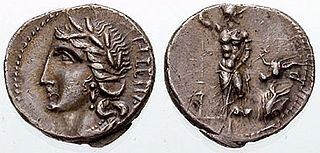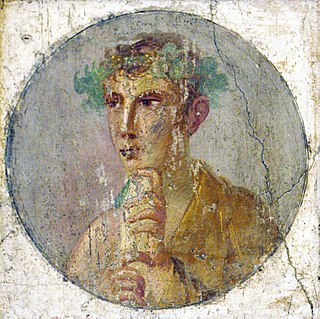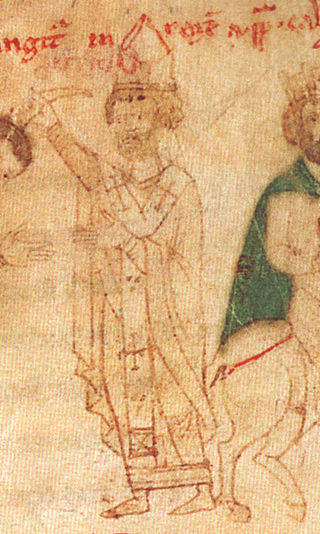Related Research Articles

Oscan is an extinct Indo-European language of southern Italy. The language is in the Osco-Umbrian or Sabellic branch of the Italic languages. Oscan is therefore a close relative of Umbrian.

In publishing and graphic design, Lorem ipsum is a placeholder text commonly used to demonstrate the visual form of a document or a typeface without relying on meaningful content. Lorem ipsum may be used as a placeholder before final copy is available. It is also used to temporarily replace text in a process called greeking, which allows designers to consider the form of a webpage or publication, without the meaning of the text influencing the design.

The just price is a theory of ethics in economics that attempts to set standards of fairness in transactions. With intellectual roots in ancient Greek philosophy, it was advanced by Thomas Aquinas based on an argument against usury, which in his time referred to the making of any rate of interest on loans. It gave rise to the contractual principle of laesio enormis.
Riothamus was a Romano-British military leader, who was active circa AD 470. He fought against the Goths in alliance with the declining Western Roman Empire. He is called "King of the Britons" by the 6th-century historian Jordanes, but the extent of his realm is unclear. Some Arthurian scholars identify Riothamus as one of the possible sources of the legendary King Arthur.
Vatican Hill is a hill located across the Tiber river from the traditional seven hills of Rome, that also gave the name to Vatican City. It is the location of St. Peter's Basilica.
Usucaption, also known as acquisitive prescription, is a concept found in civil law systems and has its origin in the Roman law of property.

Cicero's oration Pro Archia Poeta is the published literary form of his defense of Aulus Licinius Archias, a poet accused of not being a Roman citizen. The accusation is believed to have been a political move against Lucullus through Archias. The poet was originally Greek but had been living in Rome for an extended period of time. A letter from Cicero to Titus Pomponius Atticus in the year following the trial makes mention of Archias, but there is no conclusive evidence about the outcome of the trial. The oration was rediscovered in Liège by Petrarch in 1333.

In Roman law, status describes a person's legal status. The individual could be a Roman citizen, unlike foreigners; or he could be free, unlike slaves; or he could have a certain position in a Roman family either as head of the family, or as a lower member.
Indirect speech, also known as reported speech, indirect discourse (US), or ōrātiō oblīqua, is the practice, common in all Latin historical writers, of reporting spoken or written words indirectly, using different grammatical forms. Passages of indirect speech can extend from a single phrase to an entire paragraph, and this style was generally preferred by Roman historians to the direct speech commonly found in Greek authors.

The Burs were a Dacian tribe living in Dacia in the 1st and 2nd centuries A.D., with their capital city at Buridava.
Nemo judex in causa sua is a Latin brocard that translates as "no one is judge in their own case". Originating from Roman law, it was crystallized into a phrase by Edward Coke in the 17th century and is now widely regarded as a fundamental tenet of natural justice and constitutionalism. It states that no one can judge a case in which they have an interest. In some jurisdictions, the principle is strictly enforced to avoid any appearance of bias, even when there is none: as Lord Chief Justice Hewart laid down in Rex v. Sussex Justices, "Justice must not only be done, but must also be seen to be done".

De Natura Deorum is a philosophical dialogue by Roman Academic Skeptic philosopher Cicero written in 45 BC. It is laid out in three books that discuss the theological views of the Hellenistic philosophies of Epicureanism, Stoicism, and Academic Skepticism.
Usucapio was a concept in Roman law that dealt with the acquisition of ownership of something through possession. It was subsequently developed as a principle of civil law systems, usucaption. It is similar to the common law concept of adverse possession, or acquiring land prescriptively.

Theatrum Chemicum is a compendium of early alchemical writings published in six volumes over the course of six decades. The first three volumes were published in 1602, while the final sixth volume was published in its entirety in 1661. Theatrum Chemicum remains the most comprehensive collective work on the subject of alchemy ever published in the Western world.

The 1119 papal election was, of all the elections currently considered legitimate by the Roman Catholic Church, the smallest papal election of the twelfth century.
In Latin grammar, the subjunctive by attraction is a name given when the verb in a relative clause or a temporal clause which is closely dependent on a subjunctive verb becomes subjunctive itself. The name also applies to subjunctives used when a subordinate clause is "so closely connected with an infinitive as to form an integral part of" it.
Laurence Arthur Faunt was an English Jesuit theologian and missionary to Poland.
The main Latin tenses can be divided into two groups: the present system, consisting of the present, future, and imperfect; and the perfect system, consisting of the perfect, future perfect, and pluperfect.

In Roman law, the praedial servitude or property easement, or simply servitude (servitutes), consists of a real right the owners of neighboring lands can establish voluntarily, in order that a property called servient lends to other called dominant the permanent advantage of a limited use. As use relations, servitudes are fundamentally solidary and indivisible rights, the latter being what causes the servitude to remain intact despite the fact that any property involved may be divided. Furthermore, there is no possibility of acquisition or partial extinction.